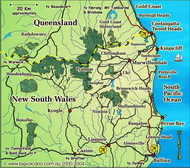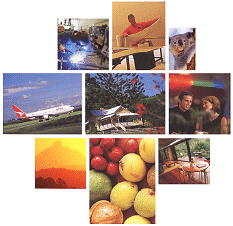General Information about Australia for Visitors - Commerce
Currency
.svg.png)
The national currency of Australia is the Australian dollar ($AU). One Australian dollar = 100 cents. Coins in circulation are 5c 10c 20c 50c $1 and $2.
Bank notes in circulation are $5 $10 $20 $50 and $100. The bank notes are rather space age plastic bills in enthusiastic colours sporting clear windows and holograms!
Australia with Australian Antartic Territory (AAT) map by Wikipedia
Australian currency is the only legal tender. Most foreign currencies and travelers cheques are easily exchanged in banks and exchange offices. Major (5 star) hotels in tourist destinations and major cities often have foreign exchange facilities.
For our North American visitors, a “check” is something you do to make sure everything is OK, or it's a pattern you wear, it's not something you write for payment. Here that's a "cheque", as in "we accept cheques with ID" or "No cheques accepted or cashed".
Currency exchange outlets are open from Monday to Friday 9:am to 6:30pm or 7:pm, and on Saturdays 9:am to 7:pm at major airports and exchange bureaus in major tourist destinations. Some are also open on Sundays. Use the Personal Currency Assistant to get a conversion for your currency, (a pop-up window will appear).
Goods and Services tax (G.S.T.)
A Goods and Services tax (G.S.T.) of 10% applies to all transactions within Australia, and receipts should show the “GST” component. Subject to certain conditions, overseas visitors maybe able to claim back the GST component and wine equalisation tax (WET), on some goods and services purcheased in Australia, via the Tourist Refund Scheme (TRS).
Credit Cards
Major credit cards such as Mastercard/Eurocard, JCB, VISA and its variations are accepted in most retail and service outlets, while coverage has declined dramatically for charge cards like American Express and Diner's Club.
Most banks and other financial institutions have 24 hour Automatic Teller Machine (ATM or "hole in the wall") access to funds. Most shopping centres now also have at least 2 or 3 banking ATMs, usually grouped together, somewhere in the complex.
Visitors with major credit cards and an activated PIN (Personal Identification Number) may withdraw cash from ATM's where the logo is displayed. American Express and Diners Club card holders will need to confirm availability and activate your PIN with your local office prior to departure, and be aware of bank charges.
Electronic Funds Transfer at Point of Sale (EFTPOS)
Most retailers, including rural businesses, now have Electronic Funds Transfer at Point of Sale (EFTPOS) debit card facilities. These may now also incorporate "Tap and Go" facilities, although if the network "goes down", having some cash is handy for essential purchases!
Google Ads
Most major credit cards can be used at these facilities as long as you have an activated PIN prior to departure. To be sure, check with your credit card company before travelling, and after arrival, double check that it is activated and working before travelling outside of metropolitan areas.
Mobile Payments
Mobile payments using digital wallet apps like Android Pay, Apple pay, Google pay, PayPal, Alipay and WeChat are now available in growing number of retail outlets, especially those located in the capital cities, who already have EFTPOS or "Tap and Go" options enabled. These include bars, restaurants, cafes, supermarkets and pharmacies.
Make sure you have cash and credit/debit cards as a backup when travelling in regional, rural and remote areas.
Trading Hours*
Banks: Are open Monday to Thursday from 9:00am or 9:30am to 4:00pm and on Friday to 5:00pm. Some state based banks (St George in New South Wales), are also open from 9:00am to 12 noon on Saturdays. See also Bank holidays.
Credit Unions are open 9:00am to 5:00pm Monday to Friday, and in major centres, may also open on Saturday mornings from 9:00am to 11:00am
Local Governemnt Administration: (councils, libraries etc.) Open from 8:30am to 4:30pm or 4:45pm Monday to Friday.
Post Office: Monday to Friday 9:am-5:pm (Some branches may also open on Saturday 9:00am-11:30am)
Retailers: 9:00am to 5:00pm or 5:30pm Monday - Friday, with late night shopping 9:00am-9:00pm Thursday. Shopping Centres (malls) often open 9:00am to 12 noon or 4:00pm on Saturdays and 10:00am to 3:00pm on Sundays, as well. Individual store openings, especially grocery, fruit and vege stores, may vary.
In most towns in the Tweed Volcano region, major supermarkets are open* from 7:00am to 9:00pm Monday to Friday, and from 10:00am to 3:00pm on Saturday and Sunday. General Stores in villages are open* from 7:00am to 6:00pm Monday to Friday and 8:00am to 1:00pm on weekends.
* Current at time of publication. Maybe subject to local variation and at traders discretion.
Tourist orientated attractions and outlets such as arts, crafts, cafes and restaurants, especially in rural areas and villages, maybe closed on weekdays e.g. Monday/Tuesday/Wednesday, to accommodate weekend visitors, so check with local vistor information centres, visitor guides, brochures and publications for details.
Visitors to our region should be aware of the one hour time difference between the states of Queensland and New South Wales during Daylight Saving. Some tourist operators and retail traders, especially in Tweed Heads, will adhere to Eastern Standard Time (AEST) as does QLD. Check with operators and traders to confirm their opening hours.
Tipping
Tipping isn't an Australian custom, due to employees previously having secure positions and good casual wages and conditions. However, due to recent changes in the restaurant and hospitality trade in particular, "penalty rates" for working on weekends have reduced dramatically and working conditions generally have changed considerably in the last ten years, so it's likely to be welcomed if you show your appreciation for above average service, or to acknowledge an especially enjoyable experience.
Most cab/taxi services now accept only credit/debit/charge card payments, but if using cash, cabbies generally expect to "keep the change", unless you've had to break a large bill.
Australian Public Holidays
Aaustralian national public holidays are New Year's Day, Australia Day, Good Friday, Easter Monday, Anzac Day, Christmas Day and Boxing Day. All other public holidays are declared by the state and territory governments, and can affect transport and accommodation tariffs during school holidays and long weekends. See also School Term dates.
While recent changes to national work conditions may see individual businesses choosing to open; banks, offices and shops are generally closed on the following public holidays in Australia.
- January 1, New Year's Day
- January 26, Australia Day, commemorating the date of the landing of the "First Fleet" of British convicts, their gaolers, livestock and supplies in Port Jackson (Sydney Harbour) in New South Wales.
- March, Labour Day. Western Australia (WA) celebrates on the first Monday in March, while Victoria (VIC) and Tasmania (TAS) celebrate Labour Day on the second Monday in March.
- March/April, Easter. Both Good Friday and Easter Monday are national holidays in Australia. However, the multi-cultural nature of Australia, with more than 120 nationalities and ethnic origins, means that Easter or Passover maybe celebrated by the Christian, Orthodox and Jewish communities at different times, affecting individual businesses and communities accordingly.
- Ramadan is also observed in Australia and observing businesses hours may be amended to suit prayer times.
- April 25, Anzac Day. Originally a commemoration of the sacrifice of Australian and New Zealand troops at Gallipoli in Turkey during WWI, Anzac Day now commemorates the memory of all those servicemen and women who died during war in the service of their country, including in United Nations operations. After a dawn service at local memorials to the fallen, Australian personnel (or a representative family member), who have seen service, march out on parade in cities, towns and villages around the country.
- May, Labour Day. The NT celebrates on the 1st Monday in May.
- June 9, Queen's Birthday. Despite Her Majesty's birthday actually being on April 21, all states officially celebrate her birthday on June 9th, except for Queensland (QLD) where the "Birthday of the Sovereign" is on the first Monday in October, and Western Australia, which takes a day off in late September
- First Monday in August Bank Holiday. Banks are closed in New South Wales and the Australian Capital Territory only.
- October, Labour Day the first Monday. In NSW, ACT, QLD and SA only. WA on the first Monday in March, VIC and TAS celebrates on the second Monday in March, and TAS, and the NT celebrates on the 1st Monday in May.
- November, first Tuesday, Melbourne Cup Day. While a public holiday only in Melbourne, the running of the Melbourne Cup, at 3.00pm AEDT, is known as "the race that stops the nation". Many businesses will have an unofficial half or full day "jolly" at work, with bosses and employees getting into the spirit of this world class horse race.
- December 25, Christmas Day
- December 26, Boxing Day. That greatest of Australian Boxing Day traditions, one of the world's great white water yacht races - the "Sydney to Hobart", starts the day off with flying colours in Sydney Harbour.
State public holidays may also affect business opening hours.
Electricity Supply
The electricity supply is 240 volt AC, 50 Hz. Three (3) pin plugs, with the active and neutral pins at about 30° to the vertical International adaptors are readily available at most technology and consumer electronics shops.
Medical Services
Health care for visitors to Australia.
The Australian Government has signed Reciprocal Health Care Agreements (RHCA) with Belgium, Finland, Italy, Malta, the Netherlands, New Zealand, Norway, the Republic of Ireland, Slovenia, Sweden, and the United Kingdom.
These agreements entitle you to some subsidised health services for essential medical treatment while visiting Australia.
However, personal health insurance is strongly recommended.
If you are travelling to Australia, either to visit or to stay, you should make arrangements for ongoing access to necessary medicine. If you are planning to bring medicine with you, you will need to check regulations regarding bringing medicine into Australia. If you need to obtain prescription medicine while you are here, the prescription must be written by a doctor in Australia.
Unless you are in a remote area, medical treatment is readily available. If you become ill or have an accident, your tour operator or accommodation can call a doctor. You will have to pay for treatment. Depending on who you go to, a doctor's consultation will cost $50-$90* and prescriptions will cost from around $30* per item.
Chemists are open* at regular shopping hours, 9:00am to 5:00pm, but every major town has at least one 24-hour pharmacy. Standard medical items such as band-aids and aspirin are readily available from service (petrol) stations, general stores, supermarkets etc..
If you are hospitalised, expect to pay* from $600 per day for your bed and anywhere from $400 to $4000 or more for surgery, depending on the operation. For emergency medical service, dial 000 (triple zero) and ask for the ambulance service.
* Current at time of publication, subject to change without notice.
Postal Services and Mail
You will find Post Offices in most suburbs and towns, open from 9:00am to 5:00pm, Monday-Friday, with some open on Saturday from 9:00am -11:30am. In rural areas and villages the general store often provides standard postal services.
Australia Post offices provide a range of postal services (land, sea, air and express), stationery and office related products, and quality souvenir and gift products. You'll find everything from local scenic postcards through to CDs, DVDs, calendars of the natives, and more. Plus of course; money orders, stamps (domestic $1.20, international from $2), envelopes, satchels and delivery boxes of all sizes.
Telecommunications
Calls to Australia: The telecommunications country code to Australia is 61.
Australia has a uniform 8 digit local number telecommunications numbering system for "landlines" (aka home phone, fixed-line, main line). "Free call" or "toll free" numbers are in 1800 xxx xxx format, and "national call" numbers are in 13x xxx format. Bricks and motor businesses usually have a landline number, and depending on their customer base, they may also provide a national or toll free number.
STD (area codes)
(02) for NSW, (03) for VIC and TAS, (08) for SA, WA and the NT, and (07) for QLD, with anomolies occuring in VIC/NSW ( 03 and 02 area codes) and NSW/QLD (02 and 07 area codes) state border areas.
To call an Australian landline telephone number from outside Australia, dial your location's international access code, + 61 + the STD code + the phone number. If you see a zero before the STD code, ignore it. E.G.: + 61 + (02) + xxxx xxxx, becomes + 61 + 2 + xxxx xxxx. Some businesses will show their telephone number as (xx) xx xxx xxx for convenience.
If you wish to make an international call from within Australia, follow the instructions provided or simply dial 0011 then the country code, area code and the local number. You can make reverse charge, person to person and point to point calls via the operator to most countries, for an extra charge.
Public Telephones are reasonably numerous in built up areas, and from 1 October 2021, standard national calls and SMS from Telstra's network of more than 15,000 pay phones were made free. Pay phones are also now completely coinless, but customers will still have to pay for overseas calls.
Phones lowered for people in wheelchairs are generally also found where more than two public telephones are available.
Google Ads
Mobile (cell) phones: Australia offers 4G and 5G digital mobile coverage, with 2 major infrastructure networks (Telstra, Optus) vying for business, and numerous secondary players (i.e. Aldi, Dodo, Virgin, Vodaphone) piggypacking off their networks.
Australian mobile phone numbers use a 12 digit numbering system in 04xx xxx xxx format.
Coverage varies with each provider, and in hilly terrain and outside metropolitan and built-up regional areas, you may not be able to make or receive digital mobile calls, even using major providers. Coastal and built up regional areas generally have good reception, but even in the cities, there are still black spots.
International visitors should check with their local provider to make sure their mobile phone is compatible with Australian networks, and to have a "global roaming" pack activated, which for European visitors in particular, may offer an affordable monthly "add-on", without the hassle of having to monitor usage or extra charges.
Another option is to just buy a local "SIM" card and usage plan with your preferred voice, SMS/text and data plan options, as there are now a wide variety to choice from.
Weights and Measures
Australia uses the metric system of distance, temperature, weights and measures. e.g. 1 metre (about 3 feet), 27° Celcius (about 80° Farenheight), 500 grams (about 1lb), although many people will still use imperial measure in everyday speech.
See also Driving Distances in Australia, for a table showing driving distances between capital cities and major destinations, in Australia.
>> Next: General Information - Hazards
References and Readings
- Image: Australia with Australian Antarctic Territory (AAT) map by Wikipedia
- YouTube video: "Australian Banknotes - Production", RBAinfo published on Youtube in 2015.
- YouTube video "The Australian Healthcare System", by Tessa Mitchell. Published on YouTube, April 25, 2016.
Google Ads
Booking.com


